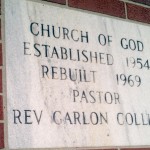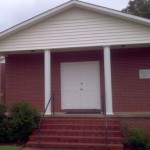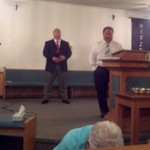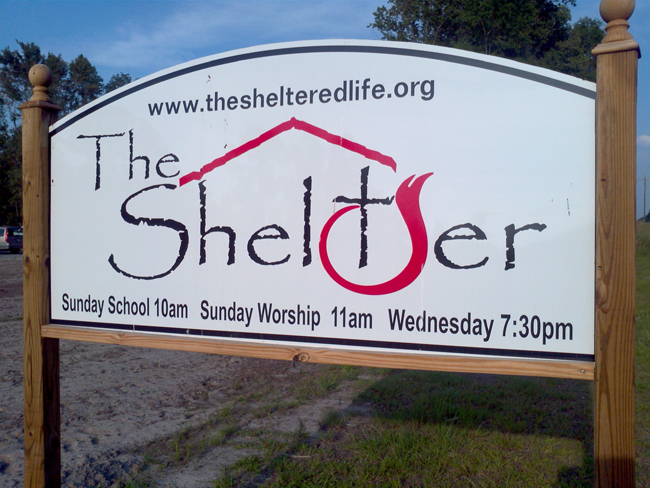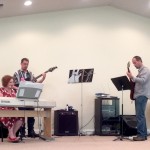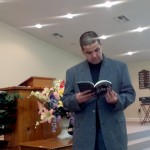John The Baptist’s Bones Found In Bulgaria
John the Baptist’s Bones Found? | Source: University of Oxford
Bones that are theorized to be the bones of John the Baptist have recently been dated to the 1st century AD, confirmed as a male, and also found to be from an mtDNA haplogroup that is most common in the Middle East region he would have been from. The bones were found in 2010 during an excavation under an old church in Bulgaria called Sveti Ivan, which translates as St. John. Under the church, in a small marble sarcophagus near the altar, was a knucklebone, a tooth, and part of a cranium. Three animal bones were also found inside the sarcophagus. Only one of the human bones found still contained enough collagen to be radiocarbon dated.
This new research from Oxford University will be presented in a documentary called ‘Head of John the Baptist’ airing on the National Geographic Channel in the UK June 17th. A team from the Oxford Radiocarbon Accelerator Unit at Oxford University dated the knucklebone, that was taken from a right hand, to the first century AD. The researchers were surprised by this, but have specified that without better evidence there is no way to prove that the bones belonged to John the Baptist.
Professor Thomas Higham said: “We were surprised when the radiocarbon dating produced this very early age. We had suspected that the bones may have been more recent than this, perhaps from the third or fourth centuries. However, the result from the metacarpal hand bone is clearly consistent with someone who lived in the early first century AD. Whether that person is John the Baptist is a question that we cannot yet definitely answer and probably never will.”
Researchers from the University of Copenhagen also contributed by reconstructing the mitochondrial DNA genome sequence from three of the bones. They established that all the bones came from the same person, and also that they were from mtDNA haplogroup that is most common in the Middle East, which is where John the Baptist was from. They also established that the bones were from a male.
Dr Hannes Schroeder said: “Our worry was that the remains might have been contaminated with modern DNA. However, the DNA we found in the samples showed damage patterns that are characteristic of ancient DNA, which gave us confidence in the results. Further, it seems somewhat unlikely that all three samples would yield the same sequence considering that they had probably been handled by different people. Both of these facts suggest that the DNA we sequenced was actually authentic. Of course, this does not prove that these were the remains of John the Baptist but nor does it refute that theory as the sequences we got fit with a Near Eastern origin.”
The archaeologists who discovered the bones also found a small box made out of hardened volcanic ash close to the sarcophagus. The box contained inscriptions in Greek that directly referenced John the Baptist and his feast day, asking God to ‘help your servant Thomas’. “One theory is that the person referred to as Thomas had been given the task of bringing the relics to the island. An analysis of the box has shown that the tuff box has a high waterproof quality and is likely to have originated from Cappadocia, a region of modern-day Turkey. The Bulgarian researchers believe that the bones probably came to Bulgaria via Antioch, an ancient Turkish city, where the right hand of St John was kept until the tenth century.”
In a separate study by Oxford researchers, it was found using historical documents that, in the fourth century AD, monks had taken relics of John the Baptist out of Jerusalem, including parts of his skull. “These relics were soon summoned to Constantinople by the Roman Emperor who built a church to house them there. These relics were soon summoned to Constantinople by the Roman Emperor who built a church to house them there. Further research by Dr Kazan suggests that the reliquary used to contain them may have resembled the sarcophagus-shaped casket discovered at Sveti Ivan. Archaeological and written records suggest that these reliquaries were first developed and used at Constantinople by the city’s ruling elite at around the time that the relics of John the Baptist are said to have arrived there.”
Dr Kazan said, “My research suggests that during the fifth or early sixth century, the monastery of Sveti Ivan may well have received a significant portion of St John the Baptist’s relics, as well as a prestige reliquary in the shape of a sarcophagus, from a member of Constantinople’s elite. This gift could have been to dedicate or rededicate the church and the monastery to St John, which the patron or patrons may have supported financially.”
Bulgarian Bible (1871 Constantinople Edition) on Amazon.com

- Bulgarian Bible (1871 Constantinople Edition) now available worldwide through Amazon.com markets
- The Story of the Bulgarian Bible presented to The Pneuma Foundation
- New Printed Revised Edition of the Constantinople Bible Published (2008)
- Digital Constantinople Bible Published (2007)
- Cup & Cross Presents “The Story of the Bulgarian Bible” at ETS (2006)
- “The Story of the Bulgarian Bible” Presentation at ETS (video)
21st Century Revival of Study Bibles
June 20, 2012 by Cup&Cross
Filed under Featured, News, Publication
 We are undertaking the task of comparing and reviewing a growing number of Study Bibles appearing on the book market recently in what appear to be a 21st century Revival of Study Bibles. We will be including some classical titles as well, but overall this study will have three parts dealing with three distinct types of Study Bibles namely: (1) Non-Pentecostal, (2) Pentecostal and (3) Prophecy Related. The following titles are among the ones we have chosen to review in the course of the study:
We are undertaking the task of comparing and reviewing a growing number of Study Bibles appearing on the book market recently in what appear to be a 21st century Revival of Study Bibles. We will be including some classical titles as well, but overall this study will have three parts dealing with three distinct types of Study Bibles namely: (1) Non-Pentecostal, (2) Pentecostal and (3) Prophecy Related. The following titles are among the ones we have chosen to review in the course of the study:
I. Non-Pentecostal
- Orthodox Study Bible – in relations to Eastern mysticism and its historical effect on the Pentecostal experience
- Reformation Study Bible – within the scope of formation of evangelical identity among Pentecostals
- Wesley Study Bible – with the purpose of studying the relations between Wesleyan-Holiness tradition and Pentecostal theology
- C.S. Lewis Bible – in the scope of its relation to Pentecostal and Charismatic ethics and religious praxis
- Maxwell Leadership Bible – as per its relations to the leadership paradigms involving and affecting Pentecostal and Charismatic communities
- NetBible and its relations to general formations within Pentecostal Theology
II. Pentecostal
- Spirit Filled Study Bible – written by leading Pentecostal scholars
- Full Life Study Bible – classic Pentecostal and foundation for the youth oriented Fire Bible and the Life In The Spirit Study Bible
- Word Study Bible – including selected teachings from Hagin, Copeland, Sumrall, Savelle, Hayes, Osborn, Wigglesworth, Kuhlman and McPherson
- Kenneth Copeland Study Bible – considered as a fundamentalist Pentecostal teaching
- Jimmy Swaggart’s Expositor’s Study Bible – as an introduction of Pentecostal ethics and praxis
- Dake Study Bible – as a classic example on Pentecostalism and Last Days Prophecy coming together
III. Prophecy Related
- Scofield Study Bible and its dispensational effect on early Pentecostals
- John Hagee Prophecy Bible combining understanding of prophetic themes with doctrines of salvation, covenants, and questions about the Christian faith.
- Jeffrey Prophecy Study Bible regarded as the most comprehensive prophecy study Bible
- Tim LaHaye Prophecy Study Bible combining the knowledge of 48 leading Bible experts of prophecy
- Jack Van Impe Prophecy Bible as a valuable source with a wealth of information on Bible prophecy
- Perry Stone Hebraic/Prophetic Study Bible gleaning from 44,000 hours of Bible Study and produced within 34 years of ministry
F. Sanders (a.k.a. Theologue) has further compiled a comprehensive list of study Bibles, which we truly recommend.
Services in South Carolina
Pentecostal Primitivism Preserved
June 10, 2012 by Cup&Cross
Filed under Books, Featured, News, Publication
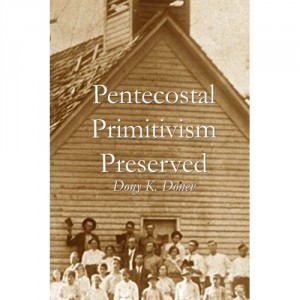 Cup & Cross Ministries International is happy to announce the publication of Pentecostal Primitivism Preserved.
Cup & Cross Ministries International is happy to announce the publication of Pentecostal Primitivism Preserved.
Entering the era of the New Millennium, the Christian Church faces a great number of new existential dilemmas. Finding their answers is not only essential, but also formational for the future of the global Christian Community. Failure to do so will transform the church into just another nominal organization separated from the leadership of the Holy Spirit and the power of God.
In attempt to answer the present ecclesial predicaments, this work suggests a way of remembering and returning to the past. Judging from his own Eastern Pentecostal Tradition and personal salvific experience, the author calls the Christian Church to neo-primitivism expressed in the rediscovering and reclaiming of the basic order of the Primitive Church of the first century. Dr.Donev proposes a new understanding of the Pentecostal experience expressed in power, prayer and praxis. Furthermore, reclaiming of the original experience is the answer for the church of the 21st century only if expressed in discipleship after the example of Christ. It is only through such process that the Christian community will be enabled to preserve its own identity and transmit the faith once delivered to the saints to the future generations.
KMJ at the Hard Rock Cafe on Beale Street in Memphis
![31854202[1]](http://kmjpraise.com/wp-content/uploads/2012/05/318542021-300x225.jpg) Our friends and long time ministry partners from the KMJ Praise Band have been invited to hold:
Our friends and long time ministry partners from the KMJ Praise Band have been invited to hold:
CHURCH ON BEALE STREET
at THE HARD ROCK CAFÉ MEMPHIS, TN
Join us in prayer to support them and make plans to be there if you are in the area, as they are preparing for this milestone in their ministry. Feel free to share the following poster information:
MATTERS OF THE HEART MINISTRY WITH KMJ PRAISE WILL BE TAKING PART IN “CHURCH ON BEALE” – A DAY OF PRAISE FOR THE LORD IN DOWN TOWN MEMPHIS, TN. SEVERAL CHRISTIAN BANDS HAVE COME TOGETHER FOR THIS AFTERNOON OF PRAISE AND WORSHIP.
ON JUNE 10,2012 KMJ PRAISE WILL START OFF THE CONCERT AT 1:00 PM. COME ONE AND ALL! COME ENJOY THE HISTORIC BEALE STREET, OUR GREAT VIEW OF THE OLE MISSISSIPPI RIVER AND AN AFTERNOON FULL OF PRAISE!
Doors at 11:30am
Show at 12:00pm
Free to the public, all ages are welcome
“Church on Beale” is a faith based concept for groups that may play music in their local churches but would like to reach out with their music to others. Seven groups are signed up to perform. Christian music has evolved over the years and the Hard Rock Cafe is giving some great musicians the opportunity to perform at their location in Memphis. From Southern Gospel to Rock Gospel this event will have quite a variety of, again, “faith based” music! This will be an uplifting event and, we involved in it, want to thank the Hard Rock Cafe for allowing us a venue for the many talented musicians to perform.
2012 South Georgia Homecoming Revival


